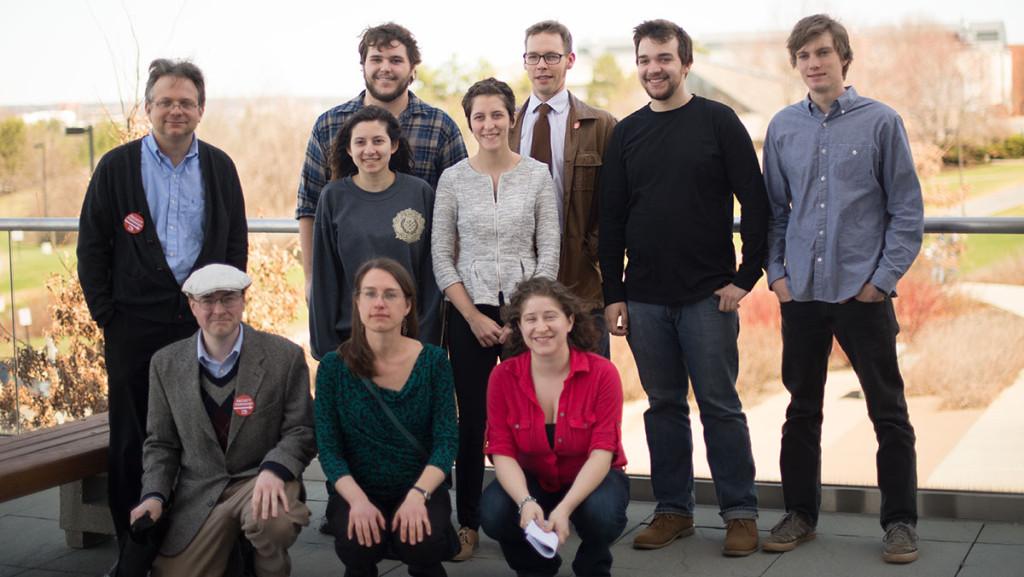Ithaca College part-time faculty members, who have been organizing in order to seek improved working conditions, elected to unionize May 28 with 76.4 percent of voters favoring the union.
A group of part-time faculty members announced in January that it was working with the Service Employees International Union, taking the first steps toward forming a union at the college. Part-time professors were paid $3,900 per three-credit course, or $1,300 per credit hour, during the 2014–15 school year, numbers which will increase as the college announced a $100 per credit increase for the fall. On April 15, part-time faculty filed a petition to unionize with the National Labor Relations Board. In response to the unionization filing, Linda Petrosino, interim provost and vice president for educational affairs, and President Tom Rochon wrote a letter to part-time faculty stating the college would prefer to “maintain a direct working relationship” with the part-time faculty and set up a “union choice” website. The contents of this website led full-time faculty to petition Rochon and Petrosino to make the information more in line with the college’s statement that it was “neither ‘anti-union’ nor ‘pro-union.’”
Paul Murphy, assistant to the regional director of the National Labor Relations Board Region 3, said there were 172 votes for unionization and 53 votes against it.
Three hundred twenty-one part-time faculty members were eligible to vote, Molly Israel, director of communications at the college, said. Any part-time faculty member who taught at least one credit at the college’s main campus during the Fall 2014 and/or Spring 2015 semesters was eligible. Two hundred twenty-five elected to do so, yielding a voter turnout of 70 percent. A simple majority of votes was needed for the union to pass.
Brody Burroughs, a lecturer in the Department of Art, said he and three other members of the Adjunct Organizing Committee, along with three representatives from SEIU and “two or three” members of the administration, went to the NLRB office in Buffalo, New York, to oversee the counting of the ballots.
Burroughs said one of the next steps is forming a bargaining committee that will take part in contract negotiations with the administration. He also said there is currently a bargaining survey circulating among part-time faculty members that will allow bargaining committee members to know what part-time faculty members would like to see.
Burroughs said he believes the bargaining committee will be formed over the summer, but the contract negotiations will probably not begin until later.
Part-time faculty members around the country have been moving to form unions in order to improve pay and working conditions and have been successful in seeing pay raises and other benefits increased at some institutions. Improving working conditions will come from the contract the union negotiates with the administration, Burroughs said, but forming the union was the beginning of those efforts.
“The first step is really that we came together and formed a union,” he said. “We really have built a strong base of support, and we have a real mandate.”
Rachel Kaufman, a lecturer in the Department of Writing and a member of the Adjunct Organizing Committee, said she was happy with the results, though she wasn’t surprised.
“I’m so excited that so many people voted yes; that is something that we frankly were expecting because we’ve done so much work talking to people and building a community,” she said.
Rochon released a statement May 28 in which he said election results are not final until the NLRB officially certifies them, which could take several weeks depending on whether any legal challenges are filed.
Rochon also said the administration will negotiate with the union when the election results are confirmed.
“Once the election is certified, the college will bargain in good faith with representatives from SEIU and our part-time faculty,” Rochon said in his statement.
As for the effect the unionization will have on procedures, Rochon said the college will not theorize on what the future may bring.
“At this time, we can’t speculate on what impact an adopted contract will have on the college’s current practices, but I am confident that together, we will continue to strengthen our commitment to providing a premier educational experience for our students,” he said in the statement.
According to a press statement from Local 200United, Ithaca College part-time faculty members join over 26,000 contingent faculty members in SEIU and Adjunct Action, one of SEIU’s projects.
While the college did create a webpage dedicated to unionization that many full-time faculty members petitioned against, Kaufman said she doesn’t think the administration’s relationship with part-time faculty is strained.
“I expect them to bargain in good faith with us across the table,” she said. “They have said that that’s their intention, and that’s what they plan to do. So we expect them to do that. I’m excited to sit down with them to negotiate for better conditions for us and for our students.”
Related Articles: A look at unions locally and nationwide
Ithaca College part-time faculty file for unionization
IC President Tom Rochon explains his position on union neutrality








